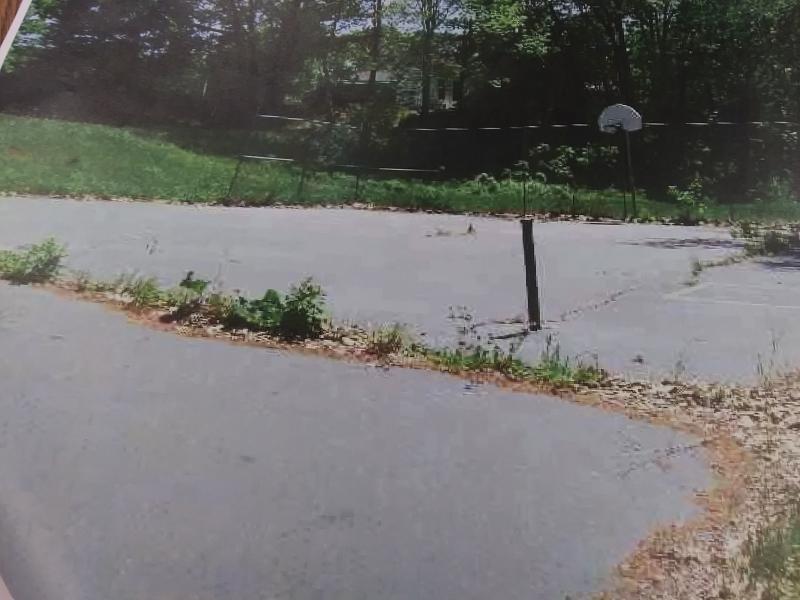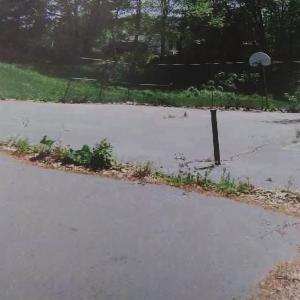Like a diamond, Edgecomb’s tennis court is forever
A lot of interesting things happened in 1974. Patty Hearst was kidnapped, Stephen King’s first novel was published and the House Judiciary committee started impeachment hearings for President Nixon.
That August, Edgecomb signed a contract with the federal Land and Water Conservation Fund for $5,853 to create a “game court” on the grounds of Eddy School on Cross Point Road.
In 2004, the school property, including the court, was sold to ElderCare Network and today is Edgecomb Green.
But there’s a problem: The grant agreement required Edgecomb to retain the tennis court. It could not “transfer” or “encumber” the property which has to be used exclusively for “public outdoor recreation ... throughout the lifetime of the facilities.”
“Tennis courts were popular and there was a surge in the ’70s and ’80s,” said Doug Beck, who oversees LWCF grants as outdoor recreation supervisor for Maine’s Bureau of Parks and Lands. “Under grants from the fund, 77 tennis court projects were completed in Maine,” Beck told the Boothbay Register in an interview.
Beck said every project funded by land and water (now 890 state projects) has to be inspected every five years. In 2010, the town received a letter saying “The National Park Service requires that ... all sites remain open to outdoor recreation in perpetuity and remain in the sponsor’s ownership ...”
In a 2013 letter to the town, state officials said the court was “abandoned.” Because the grant required a tennis court in Edgecomb in perpetuity, the town was instructed to find “replacement property not currently open to outdoor recreation...” to replace the site. A letter from the state the following year reminded the town it would need to find “a replacement property of equal or greater appraised value of the tennis courts, be owned by the town and not currently used as recreation.”
Beck told the Boothbay Register the town would need to apply for a “conversion”: Provide a new recreational area of equal assessed value to the tennis court. The town can’t just repay the $5,853. “Once you get funding to build a park, there’s always going to be a park in your community.”
Calculating the area has a complication: Beck said because the maps weren’t drawn according to current interpretations, there is no boundary identified between the school property and the tennis court, so the assessed value of both school and tennis court would be used if the town offered a substitute parcel. “The starting basis to determine the impact is whatever were the public school boundaries at the time,” Beck said.
The replacement property doesn’t have to be a tennis court. Beck said Edgecomb would have to decide “If not there, where?” and “If not that, what?”
Whatever the town decides, it will have to acquire more land for the purpose. “You can’t just move the protection from the old part to the new,” Beck advised. Asked if a public boat landing might be approved, he replied, “As long as it’s not on land currently owned by the town and is of equal or greater value than the tennis court property, it’s not a bad fit.”
Beck said there is no “hard and fast” deadline and his only way to assure compliance is “to turn off the funding spigots.” The town would not be eligible for either the Community Recreation or LWCF grants Beck oversees. In addition, he shares his “naughty list” with other grant programs in the bureau, which would make it harder for Edgecomb to get other grants.
Other towns have been in the same predicament. According to Beck, a town in southern Maine received a $20,000 grant to create tennis courts on the grounds of a school. The entire property totaled 19 acres. About 10 years ago, the school closed, the town sold the property and had to find land worth $1.2 million to create a new recreational area of similar assessed value to the original school property. Beck said there are currently about 40 active conversion properties in the state.
Beck said he understands some of the projects get overlooked over the years. “Most towns are very sympathetic to it,” he said. “They understand the commitment.” Over the years, both Edgecomb’s Recreation and Capital Improvement committees have wrestled with the tennis court issue.
In July 2018, Beck discussed options with selectmen. In a meeting Aug. 26, Selectman Mike Smith raised the question again. But there are no easy or quick solutions and, for now, the ball is in Edgecomb’s court.
Event Date
Address
United States


























